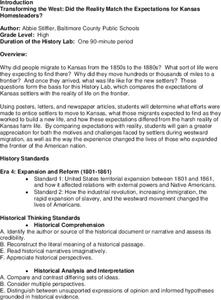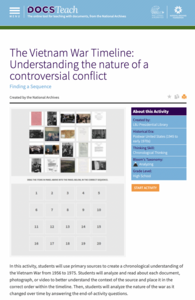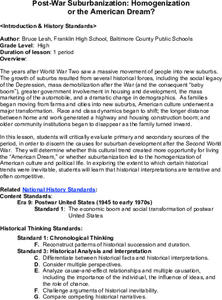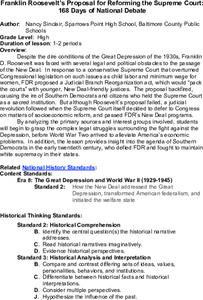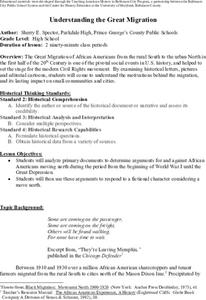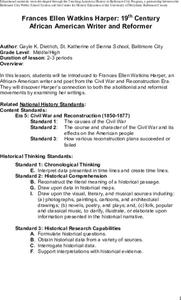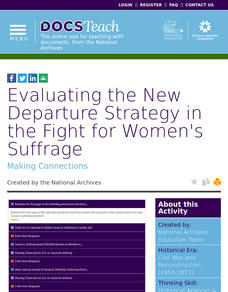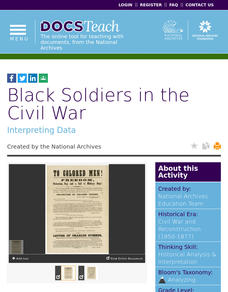American Institute of Physics
African Americans in Astronomy and Astrophysics
A two-part lesson focuses on the contributions to the fields of astronomy and astrophysics of two African Americans: Benjamin Banneker and Dr. George Carruthers. In part one, scholars learn about Benjamin Banneker by examining his...
National Park Service
Remembering Pearl Harbor: The USS Arizona Memorial
Young historians use primary source materials to investigate the 1941 attack on Pearl Harbor and the sinking of the USS Arizona. After reading background articles and studying maps and images of the attack, class members consider whether...
Center for History Education
U.S. Foreign Policy and the Iran-Contra Affair: Was Oliver North a Patriot, a Pawn, or an Outlaw?
If you had to write a song about Oliver North, would it be a ballad or a dirge? If you had to put him on a trading card, would he be a hero or the bad guy? Young historians decide for themselves after examining documents from the...
Center for History Education
Guatemalan Coup of 1954: How Did the Cold War Influence American Foreign Policy Decisions?
Was it all about the bananas—or the fear of a communist threat? Young historians use a history lab to examine documents from the American-led 1954 Guatemalan coup. Using graphics, government documents, and speeches, they examine the...
Center for History Education
The Triangle Shirtwaist Factory Fire: Is Anyone to be Punished for This?
The stories of bodies falling to the pavement and girls dying in their seats echo to the present day. The New York City Triangle Shirtwaist Factory fire—which killed 147 people, mostly young women and girls—galvanized the labor movement...
Center for History Education
Transforming the West: Did the Reality Match the Expectations for Kansas Homesteaders?
They expected good soil and hearty crops ... but they found buffalo chips and grasshopper plagues. Using an advertisement encouraging famers to go west, budding historians examine primary sources including letters, photographs, and...
DocsTeach
The Vietnam War Timeline: Understanding the Nature of a Controversial Conflict
The story of the Vietnam War is often told through images. Young historians analyze images and primary sources —including the Vietnamese Army's Seven Commandments poster and photos of the daily life of soldiers—to construct a timeline of...
Center for History Education
Post-War Suburbanization: Homogenization
The results of World War II made waves all the way to suburban life today. Examine the flight from the cities using images and documents from the 1950s building boom, including a quote analysis and political cartoons. The resource...
Center for History Education
Continuity or Change? African Americans in World War II
While World War II was a pivotal moment in history, historians debate its importance to the civil rights movement. Class members consider the implications of segregation and the war using a series of documents and a jigsaw activity....
Center for History Education
Franklin Roosevelt's Proposal for Reforming the Supreme Court: 168 Days of National Debate
Was it overreach or wise executive functioning? Scholars have long debated Franklin Roosevelt's court-packing scheme when he attempted to stack the court with justices friendlier to his New Deal measures. Now, learners pick up the...
Center for History Education
The Federal Theatre Project: Analyzing Conflict Among Relief, Art, and Politics in 1930s America
In the effort to soothe the suffering of the Great Depression, New Deal programs funded a variety of approaches - including a theater project that proved controversial! Using documents such as oral histories, as well as photographs of...
Center for History Education
Dust Bowl Story
Images of the Dust Bowl during the Great Depression are haunting in the suffering they show. Young historians use photographs—both iconic and lesser known—to tell about the human experience during this time. A series of photographs, as...
Center for History Education
Understanding the Great Migration
What would make someone leave home and travel thousands of miles to find another one? Young historians look at letters, demographic data, and artwork to answer the question for the Great Migration, or the movement of thousands of African...
Center for History Education
Frances Ellen Watkins Harper: 19th Century African-American Writer and Reformer
Although some African American abolitionists—such as Sojourner Truth and Frederick Douglass—are well known, others, like Frances Ellen Watkins Harper, remain in the shadows of history. Harper was a poet and activist who played an...
Center for History Education
Northern Racism and the New York City Draft Riots of 1863
Just how racist were some people in the North during the American Civil War? Using excerpts of the Conscription Act, as well as graphic images of lynchings, young historians consider why white people in New York City rioted and killed...
DocsTeach
The Civil War: Celebrate or Commemorate? Debate Definitions
Match game for the win! Build learners' historical vocabulary using an interactive matching game. Class members match each term to its definition with a tap. A writing prompt rounds out the lesson, leading to further discussion on how...
National Park Service
Discover the Mary Ann Shadd Cary House
Mary Ann Shadd Cary was an extraordinary woman, no matter the time period. Academics research the life and achievements of Mrs. Cary, who was born a free African American in 1823. The lesson uses primary sources, worksheets, written...
DocsTeach
Lincoln's Suspension of Habeas Corpus During the Civil War
What is the balance between constitutional rights and security during a war? Young historians debate the question while looking at Lincoln's decision to suspect habeas corpus during the Civil War. After reviewing his order, discussion...
DocsTeach
From Dred Scott to the Civil Rights Act of 1875: Eighteen Years of Change
What do a photo of Abraham Lincoln, a map for the Battle of Antietam, and the Dred Scott decision all have in common? Learners consider the broader question as they examine documents related to civil rights during the Civil War and...
DocsTeach
Evaluating the New Departure Strategy in the Fight for Women's Suffrage
When women demanded their right to vote, did the Constitution already protect it? The New Departure Strategy in the women's suffrage movement made this claim through court hearings. Using documents, such as transcripts from Susan B....
DocsTeach
Comparing Civil War Recruitment Posters
African Americans fought in the Civil War, and they were recruited by both the Union and the Confederacy! By comparing the wording of posters—one directed at freedmen and another to the owners of enslaved people—young historians discover...
DocsTeach
Black Soldiers in the Civil War
Get hands on virtually with recruitment posters for African American soldiers during the Civil War with an interactive online resource. By highlighting key phrases in the posters using an Internet tool, learners discover how African...
DocsTeach
A Petition for the Cotton Gin
While almost forgotten today, the cotton gin could be seen as one of the causes of the Civil War. The innovation led to more cotton production, which in turn undermined political power balances in the 1800s. Individuals unpack the...
National Endowment for the Humanities
The Gulf of Tonkin Resolution and Escalation of the Vietnam War
The Gulf of Tonkin Resolution propelled America's involvement into a bloody conflict—and it was based on a fallacy. Using the resolution and other documents from the Vietnam War, including declassified documents, young historians...







